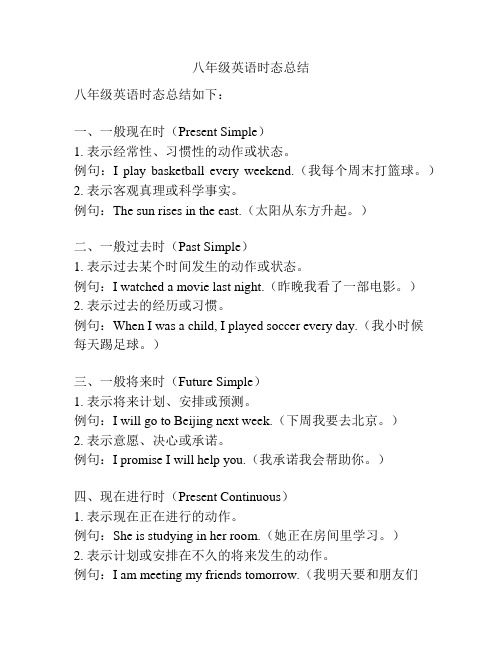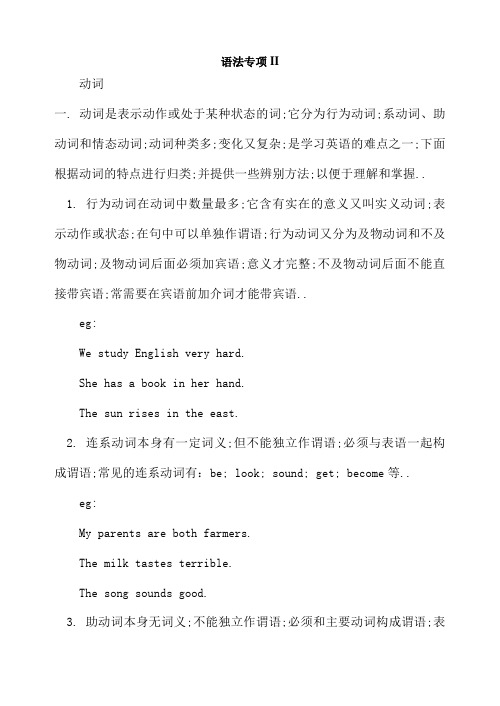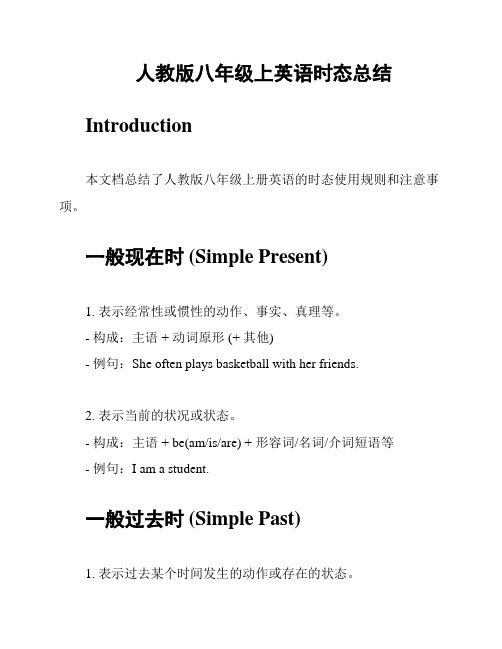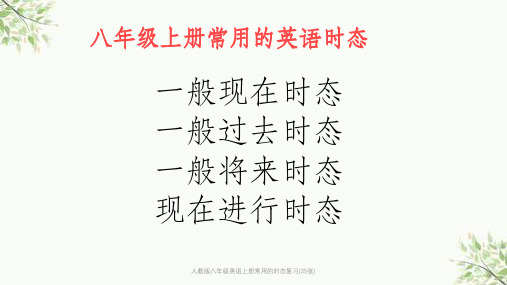八年级英语时态专题讲义
人教八年级英语必考八大时态结构及用法详解

人教八年级英语必考八大时态结构及用法详解英语八大时态:1.一般现在时标志:动词原形1.表示经常性或习惯性动作,常与表频度的时间状语连用:S h e o f t e n s p e a k s E n g l i s h.I l e a v e h o m e f o r s c h o o l a t7e v e r y m o r n i n g.2.表示现在的状态、特征、职业、能力、感觉等:H e s e e m s t o f e e l a b i t d o w n t o d a y.H e w o r k s a s a d r i v e r.3.表示真理、客观存在、科学事实或用于格言警句中:S h a n g h a i l i e s i n t h e e a s t o f C h i n a.C o l u m b u s p r o v e d t h a t t h e e a r t h i s r o u n d.W h e r e t h e r e i s a w i l l,t h e r e i s a w a y.4.表示现在瞬间的动作:H e r e c o m e s t h e b u s!5.表示将来1)表按规定、计划、安排将要发生的动作(仅限于某些表示“来、去、动、停、开始、结束、继续”等的趋向动词),可以与表示未来的时间状语搭配使用。
常见的用法是:飞机、火车、轮船、汽车等定期定点运行的交通状况。
如:T h e n e x t t r a i n l e a v e s a t3o’c l o c k t h i s a f t e r n o o n.H o w o f t e n d o e s t h e s h u t t l e b u s r u n?2)在时间和条件状语从句中常使用一般现在时表示将来发生的事情:W h e n B i l l c o m e s(不用w i l l c o m e),a s k h i m t o w a i t f o r m e.I s h a l l g o t h e r e t o m o r r o w u n l e s s I’m t o o b u s y.2.一般过去时标志:动词过去式*闭音节:元音字母a, e, i, o, u如果发字母本来的音则称为开音节,否则称为闭音节。
2020年八年级下册英语讲义:Unit 5 What were you doing when the rainstorm came 语法及写作(新人教版)

精品讲义·备战中考 教师资源·优而教学 Unit 5 What were you doing when the rainstorm came? 语法及写作 Grammar 语法讲解:过去进行时 过去进行时(Past continuous tense或Past Progressive tense) 表示在过去某一时刻或某一段时间内发生或进行的动作或状态.
具体概念 一、 概念和用法: 过去进行时表示在过去某一时刻或某一段时间内进行或发生的动作.其形式为was /were + V-ing.常与表示过去的时间状语连用,如:last night,last Saturday等;或者与when,while,as引导的过去时间状语连用.例如: We were watching TV from seven to nine last night. 昨天晚上七点到九点的时候我们在看电视. What was he researching all day last Sunday? 上周日他一整天都在研究什么? 二、 过去进行时可以表示在过去某个时间点发生的事情.时间点可以用介词短语、副词或从句来表示.如: What was she doing at nine o‘clock yesterday? 昨天晚上九点她在做什么? (介词短语表示时间点) When I saw him he was decorating his room. 当我看见他的时候他正在装饰房间. (when从句表示时间点) 三、 在复合句中,如果主要动作和背景动作都是延续的或同时发生的,那么主从句的动词都可用过去进行时.例如: While he was waiting for the bus,he was reading a newspaper.他边等车边看报. (两个动作都是延续的) He was cleaning his car while I was cooking. 他擦车时我在做饭. (两个动作同时进行) 四、通常不能用于过去进行时的动词有agree,is,am,are,believe,belong,care,forget,hate,have,hear,know,like,love,mean,mind,notice,own,remember,seem,suppose,understand,want,wish等. 例如:误:I was knowing the answer.正:I knew the answer. 我知道答案. 误:I wasn‘t understanding him.正:I didn‘t understand him. 我不明白他的意思.
八年级英语时态总结

八年级英语时态总结八年级英语时态总结如下:一、一般现在时(Present Simple)1. 表示经常性、习惯性的动作或状态。
例句:I play basketball every weekend.(我每个周末打篮球。
)2. 表示客观真理或科学事实。
例句:The sun rises in the east.(太阳从东方升起。
)二、一般过去时(Past Simple)1. 表示过去某个时间发生的动作或状态。
例句:I watched a movie last night.(昨晚我看了一部电影。
)2. 表示过去的经历或习惯。
例句:When I was a child, I played soccer every day.(我小时候每天踢足球。
)三、一般将来时(Future Simple)1. 表示将来计划、安排或预测。
例句:I will go to Beijing next week.(下周我要去北京。
)2. 表示意愿、决心或承诺。
例句:I promise I will help you.(我承诺我会帮助你。
)四、现在进行时(Present Continuous)1. 表示现在正在进行的动作。
例句:She is studying in her room.(她正在房间里学习。
)2. 表示计划或安排在不久的将来发生的动作。
例句:I am meeting my friends tomorrow.(我明天要和朋友们见面。
)五、过去进行时(Past Continuous)1. 表示过去某一时刻正在进行的动作。
例句:He was reading a book when I entered the room.(我进屋的时候他正在读书。
)2. 表示过去同时发生的两个动作。
例句:I was cooking while he was watching TV.(他在看电视的时候我在做饭。
)六、将来进行时(Future Continuous)表示将来某个时间正在进行的动作。
八年级英语上册时态复习

语法专项II动词一. 动词是表示动作或处于某种状态的词;它分为行为动词;系动词、助动词和情态动词;动词种类多;变化又复杂;是学习英语的难点之一;下面根据动词的特点进行归类;并提供一些辨别方法;以便于理解和掌握..1. 行为动词在动词中数量最多;它含有实在的意义又叫实义动词;表示动作或状态;在句中可以单独作谓语;行为动词又分为及物动词和不及物动词;及物动词后面必须加宾语;意义才完整;不及物动词后面不能直接带宾语;常需要在宾语前加介词才能带宾语..eg:We study English very hard.She has a book in her hand.The sun rises in the east.2. 连系动词本身有一定词义;但不能独立作谓语;必须与表语一起构成谓语;常见的连系动词有:be; look; sound; get; become等..eg:My parents are both farmers.The milk tastes terrible.The song sounds good.3. 助动词本身无词义;不能独立作谓语;必须和主要动词构成谓语;表示疑问;否定;时态或其它语法形式..常见的助动词有:be; have; do; will; shall等..eg:Do you have a brotherHave you got an English-Chinese dictionaryI didn’t go to the cinema yesterday.4. 情态动词本身有词义;但不能独立作谓语;只能和主要动词一起构成谓语;表示说话者的语气和情态;情态动词没有人称和数的变化;情态动词本身可以构成疑问和否定;常见的情态动词有:can; may; must; will; shall; need等..eg: Can you sing the English songEveryone must get to school on time.二. 动词的时态:一时态概述:作谓语的动词用来表示动作情况发生时间的各种形式称为时态;英语中的时态;就是通过特殊的动词词尾或加一些相关的助动词be; havehas等;用来表示动作或事件发生的不同时间和方面..eg: He reads newspapers every day.He read the newspaper yesterday.He is going to read the newspaper tomorrow.二一般现在时:1. 动词变化:一般现在时主要用动词原形表示;但第三人称单数后要加词尾-s;另外be和have有特殊的人称形式..在加词尾-s时要注意:读音:2. 一般现在时主要表示:1经常性或习惯性的动作;常与这样的时间状语连用:always; often; usually; sometimes等eg: We always help each other.It often snows in winter.I get up early every morning.2表示主语现在的特征、性格、能力等..eg: He loves sports.Jane is an outgoing girl.Tom and Tim both have medium height.3表示客观、普遍真理eg:Two and four makes six.Water boils at 100℃The moon moves round the earth.3. 一般现在时的疑问句一般以在句首加助动词do;does的方式构成..第三人称单数加does;其他加do;这时动词一概用原形;动词be只需与主语位置对调就行了..eg: Do you like EnglishDo they have story booksWhat does she do every eveningIs she at homeAre you good at English4. 一般现在时的否定式是do notdon’t或does not doesn’t+动词原形来构成的;be动词做谓语动词只需在be后加not构成否定..eg:I don’t like oranges at all.She doesn’t work in the TV station.They aren’t students.I’m not busy every weekend.三. 现在进行时:1. 动词变化:现在进行时由“am /is /are+动词现在分词”构成..加-ing的规则如下:1一般在动词原形末尾加-ing..如:stay-staying do-doinglisten-listening suffer-sufferingwork-working spend-spendinglook-looking2以不发音的字母e结尾的动词;先去掉e;再加-ing..如:make-making take-takinggive-giving ride-ridingplease-pleasing refuse-refusingclose-closing operate-operating3以一个辅音字母结尾的重读闭音节词;先双写这个辅音字母;再加-ing..如:put-putting sit-sittingrun-running win-winningbegin-beginning2. 现在进行时的用法1表示说话时正在进行或发生的动作;这时可以不用时间状语;也可以和now; at present; at the moment等时间状语连用..有时用一个动词;如look看;listen听..eg: What are you reading nowListen Someone is singing in the classroom.2表示当前一段时期的活动或现阶段正在进行的动作..eg: They are working in a factory these days.More and more people are giving up smoking.3表示最近按计划或安排要进行的动作..现在进行时有时可表示一个在最近按计划或安排要进行的动作;即可以用来代替将来时..eg: When are you leavingAre you going to Tibet tomorrow3. 现在进行时的否定句和疑问句比较简单..否定句在beam; is; are后面加not;疑问句把be动词移到主语前..eg:I am not working.What are you reading nowHow are you feeling todayThe train isn’t arriving soon.四. 一般过去时:1. 动词变化:一般过去时主要表示过去的动作或状态;在句中由主语+动词的过去式来表达..2. 一般过去时的基本用法:1带有确定的过去时间状语时;要用过去时..eg: yesterday; last year; just now; two days ago; in the old days等eg: He left just now.Lei Feng was a good soldier.What did you have for breakfast this morning2表示过去某一段时间内经常或反复发生的动作;这时常和表示频度的状语连用..eg: Last term we often did experiments.He always went to work by bus.五. be going to 表示一般将来1. 用法:表示现在打算在最近或将来要做的事;或表示说话人根据已有的迹象认为很有可能要发生的事情;be随着人称的变化变成am; is; areeg: We are going to have a new subject this year.It’s going to rain this afternoon.I’m going to be a pilot when I grow up.2. be going to 的否定句在be动词后加上not;be going to 的疑问句把be动词移到主语前..eg:He isn’t going to see his brother tomorrow.I’m not going to tell you about it.Who’s going to use itIs your sister going to bring your lunchWhat are you going to do next Sunday.模拟试题答题时间:70分钟一. 改错:例1:The rose dark red. →The rose is dark red.1. He very likes swimming.2. He can helps you.3. We haven’t a good time.4. What are you do after school every day5. Sometimes I listen music. sometimes I play outside.6. The fish smells not good.7. We should buy some chicken. There are little left.8. There have many birds in the sky.9. My mother’s glasses is broken.10. A pair of shoes are nearly one thousand.11. What colour are her hair12. Does he his homework13. A: Do you like your classB: Yes. I like.14. He always do his shopping on Friday evening.15. I very sorry I forgot your birthday.16. I have no brother and sister.二. 连词组句:1. listen; morning; the; to; I; radio; the; in; often2. of; men; nurses; good; sick; hospital; care; in; take; the3. weekdays; he; the; goes; cinema; never; during; the; to4. computer; got; new; you; a; have5. weekends; he; rest; does; a; got; have; on6. good; Li Ming; do; and; often; I deeds7. museum; they; the; often; science; visit; how; do8. the; in; any; there; kitchen; food; is9. homework; does; day; when; Tom; his; every; where; and; do10. a; there; vegetables; many; but; apples; aren’t; lot; there; of; are; there三. 用括号里的动词的适当形式填空:1. There be______some glasses on it.2. He go______to the park every day.3. My uncle live______ in Nanjing now.4. ______ Lucy and Lily like______China5. Li Leinot like______ to drink orange soda.6. The girl go______ home at 4:30 in the afternoon.7. ______ Kate speak______ French Yes; she does.8. Jim not ride______his bike often.9. If he be______ free tomorrow; he go______ with us.10. As soon as they get______ there next month; he call______me.11. ______Li Ming’s father have______ his lunch at home12. Tom not do______the morning exercises often.13. I be______ hungry and my sister be______ thirsty.14. The baby have______ curly hair.15. Everybody have______ a chance to win.16. I clean______ my room once a week.17. Nobodytell______ them anything.18. There be______ a lot of chicken on the plate.19. Mr. Li teach______ the second grade.20. The boy watch______ TV every evening.21. Mary play______the violin quite well.22. David study______Chinese and I study______ English.23. The game be______ interesting.24. Many children be______ on the playground.25. He have_______ a good time at your party.26. I have______ a new bicycle.四. 用所给词的适当形式填空:1. Tom and his father ______swimnow.2. Look They ______runalong the street.3. We ______practicehard these days because we will have a big match next month.4. What ______he ______do at nine o’clock last night5. They ______listento the music at that time.6. When the headmaster came in; the students______readthe text.7. We ______watchTV when suddenly the telephone rang.8. She ______makethe paper flowers the whole night.9. A: _______ you ______studyingEnglishB: Yes; I am.10. Let’s go out. It ______not rainnow.11. Hurry up Everybody ______waitfor you.12. A: ______you / listento the radioB: No; You can turn it off.13. I ______watchTV at seven o’clock yesterday evening.14. A: What ______you / lookforB: I ______lookfor my wallet. There is something important in it.15. Look. It ______rainhard. We’ll get wet if we go out.五. 选词填空:一选词填空:1. I ______am; is; was; werebusy last week.2. Tom and I ______am; are; was; werelate for school yesterday.3. I ______walk; walks; walked; walkingto school the other day.4. Rose ______does not; didn’t; has been; has tovisit her uncle the month before lastmonth5. There ______is; was; are; werea lot of people in this village ten years ago.6. Mother ______am; is; was; wereill in bed last night.7. It ______rain; rains; rained; raininga lot last year.二用括号中动词的适当形式填空:1. My uncle in London ______senda birthday present to me yesterday.2. When ______beyou born3. As soon as he arrived in the country; he ______phoneme.4. When I ______knockat his door; he was cooking.5. We were watching TV when the light ______goout.6. He said he ______not likemaths at all.三用括当的词完成下列句子..1. ______you make this cake last night Yes. I did. I _______it for you.2. Did Tom _______ home at five yesterdayNo; he _______. He came home at six.3. What _______ you _______ at the store I bought a camera.4. Were you at home yesterday Yes; I _______.5. Where did you catch the fish I _______ it in the river near my house.六. 完成下列句子:1. 你长大了想当什么我打算当个电脑程序员..What _____ you ______ ______ _______ when you ______ _______ I’m ______ to _______ a _______ _______.2. 你哥哥长大了打算当什么他打算当个专业的篮球运动员..What _____ your brother _____ _________ ______ when he _____________He’s _____ to ______ a _______ _________ player.3. 你打算怎么做我打算学计算机学.._____ are you ______ ________ ________ thatI’m _____ _______ _______ computer _______.4. 你哥哥打算怎么做他打算每天练篮球.._____ is your brother _____ _____ _____He’s _____ ______ _________ basketball every day.5. 她打算下学期上一些表演课吗是的..______ she ______ _______ _________ some ______ lessons Yes; she ________.试题答案1. He likes swimming.2. He can help you.3. We don’t have a good time.4. What do you do after school every day5. Sometimes I listen to music; sometimes I play outside.6. The fish doesn’t smell good.7. We should buy some chicken. There is little left.8. There are many birds in the sky.9. My mother’s glasses are broken.10. A pair of shoes is nearly one thousand.11. If he doesn’t feel well he will go to visit the History Museum.12. What colour is her hair13. Does he do his homework14. A: Do you like your classB: Yes. I do.15. He always does his shopping on Friday evening.16. I am sorry I forgot your birthday.二.1. I often listen to the radio in the morning.2. Nurses take good care of sick men in the hospital.3. He never goes to the cinema during the weekdays.4. Have you got a new computer5. Does he have a rest on weekends6. Li Ming and I often do good deeds.7. How often do you visit the science museum8. Is there any food in the kitchen9. When and where does Tom do his homework every day10. There are a lot of vegetables but there aren’t many applesthere.Or: There are a l ot of apples but there aren’t many vegetables there.三. 1. are 2. goes 3. lives 4. Do; like 5. doesn’t like6. goes7. Does; speak8. doesn’t ride9. is; will go 10. get; will call 11. Does; have12. doesn’t do13. am; is 14. has15. has 16. clean 17. tells 18. is19. teaches 20. watches 21. plays 22. studies; study23. is 24. are 25. has 26. have四. 1. are swimming 2. are running 3. are practicing4. was; doing5. were listening6. were reading7. were watching 8. was making 9. Are; studying10. isn’t raining11. is waiting 12. Are you listening13. was watching 14. are you looking; am looking15. is raining五.一1. was 2. were 3. walked 4. did not 5. were 6. was7. rained二1. sent 2. were 3. phoned 4. knocked 5. went 6. didn’t like三1. Did; made 2. come; didn’t3. did; buy4. was5. caught六.1. are; going; to; be; grow; up; going; be; computer; programmer2. is; going; to; be; grows; up; going; be; professional; basketball.3. How; going; to; do; going; to; study; science4. How; going; to; do; that; going; to; play5. Is; going; to; take; acting; is。
人教版八年级上英语时态总结

人教版八年级上英语时态总结Introduction本文档总结了人教版八年级上册英语的时态使用规则和注意事项。
一般现在时 (Simple Present)1. 表示经常性或惯性的动作、事实、真理等。
- 构成:主语 + 动词原形 (+ 其他)- 例句:She often plays basketball with her friends.2. 表示当前的状况或状态。
- 构成:主语 + be(am/is/are) + 形容词/名词/介词短语等- 例句:I am a student.一般过去时 (Simple Past)1. 表示过去某个时间发生的动作或存在的状态。
- 构成:主语 + 动词过去式 (+ 其他)- 例句:He studied English last night.一般将来时 (Simple Future)1. 表示将来某个时间或将来经常性发生的动作。
- 构成:主语 + will + 动词原形 (+ 其他)- 例句:They will visit their grandparents next week. 现在进行时 (Present Continuous)1. 表示当前正在进行的动作。
- 构成:主语 + be(am/is/are) + 现在分词(+ 其他) - 例句:She is watching TV right now.过去进行时 (Past Continuous)1. 表示过去某个时间正在进行的动作。
- 构成:主语 + was/were + 现在分词(+ 其他)- 例句:They were playing soccer at that time.高级时态1. 现在完成时 (Present Perfect)- 表示过去的某个时间到现在的动作或状态。
- 构成:主语 + have/has + 过去分词(+ 其他)- 例句:I have finished my homework.2. 过去完成时 (Past Perfect)- 表示过去的某个时间之前的动作或状态。
人教版英语八年级英语句型及语法(英语动词的时态)附解析

人教版英语八年级英语句型及语法(英语动词的时态)附解析一、初中英语动词的时态1.--Where is Grace?--She with her brother playing basketball at school.A.is practice B.is practicing C.are practicing D.are practice【答案】B【解析】句意:——格雷斯在哪里?——她正在和她哥哥在学校练习打篮球。
be后跟现在分词,构成现在进行时态,此句的主语为she,with her brother做状语,be用is,故答案为B。
点睛:主语为单数名词或代词,尽管后面跟有with,together with,along with,as well as,besides,except,but,like等介词或介词短语时,谓语动词用单数形式。
例如:Mike with his father has been to England. 迈克同他的父亲去过英格兰。
Mike, like his brother, enjoys playing football. 迈克像他的哥哥一样喜欢踢足球。
2.--- Where’s my father? Could tell me?--- He to Beijing. He’ll attend an important meeting.A.goes B.is going C.has gone D.has been【答案】C【解析】【详解】句意:——我的父亲在哪里?可以告诉我吗?——他已经去北京了。
他将参加一个重要会议。
考查动词时态辨析。
根据句意语境,可知父亲不在说话的地点已经去了北京,需用现在完成时,可排除AC两项。
have been to意为“曾经去过某地”,现在已不在那里了;have gone to意为“到某地去了”,说话时作句子主语的人不在现场,故选C。
3.By the time I ________ on the TV, Beckham ________ two goals.A.turned; have scored B.turned; had scoredC.had turned; have scored D.had turned; had scored【答案】B【解析】句意:当我打开电视的时候,贝克汉姆已经进了两个球。
人教版八年级英语上册常用的时态复习(35张)

• The train leaves at 17:40.
会议在七点钟开始。
火车17:40离开。
人教版八年级英语上册常用的时态复习(35张)
一般现在时态的几点注意:
• 3)书报的标题、小说、戏剧、图片等情节介绍常用 一般现在时。例如:
• China Declares Manned Spaceflight Successful.
弗朗西斯穿过去,把球传给姚明,姚明跳起来,接住球投进篮里。
人教版八年级英语上册常用的时态复习(35张)
一般现在时态的几点注意:
• 4) 在由if, unless, even if ,so long as , as long as 等引导的 条件状语从句和在由when, before, after, until, till, as soon as, by the time, each time, the moment, immediately等引导的时间状语从句中,常用一般现在时表示 将来时间。例如:
• Please let me know immediately you get the results. 你一得到 结果,就请马上告诉我。
人教版八年级英语上册常用的时态复习(35张)
一般现在时态的几点注意:
• 5),还要注意其动词形式的变化。该时态主要由动词 原形表示,但第三人称单数后要加词尾-s或 -es,be 和have有特殊的变化形式, be (am, is , are) have( has ) 。例表如下:
人教版八年级英语上册常用的时态复习(35张)
一般现在时的几种主要用法
• 1)一般现在时表示客观事实、客观存在的普遍真理、 用于一般现在时的时间状语常见的有:often, usually,always,sometimes, seldom,ever, never,every day(week,month,year), once a year,now and them,from time to time。例如:
八年级英语上册专题知识讲义-被动语态(2)(附练习及答案)-人教版

被动语态(2)【考向解读】中考对被动语态的考查主要集中在:1. 掌握被动语态的构成和基本用法2. 中考中题型和大体分值:单选(1分)写句子(1分)写作(1分)阅读理解(2分以上)【重点点拨】一、知识精讲(一)什么是被动语态英语语态:语态是动词的一种形式,用以表示主语和谓语之间的关系。
当主语是谓语动作的执行者时,则为主动语态;当主语是谓语动作的承受者时,则为被动语态。
【例句】英语中的谓语动词有两种语态:1.We speak English.主语谓语宾语主动语态English is spoken by us.主语谓语宾语被动语态2.I love you.主语谓语宾语主动语态You are loved by me.主语谓语宾语被动语态(二)被动语态的结构be+动词的过去分词注意:被动语态的时态变化只改变be的形式,过去分词部分不变。
句中动作的执行者由by 引导且置于谓语动词之后,不需要时可以省略。
典例1. _____a new library _____ in our school last year?A. Is, builtB. Was, builtC. Does; buildD. Did; build答案:B思路分析:从时间状语可以判断出是过去时的被动语态。
故选择B2. So far, the moon ____ by man already.A. is visitedB. will be visitedC. has been visitedD. was visited答案:C思路分析:So far 意为“到目前为止”,是现在完成时的标志词,故答案是C。
3. —When ___ this kind of computers______?—Last year.A. did; useB. was; usedC. is; usedD. are; used答案:B思路分析:首先,根据答语last year可知问话应用过去式;其次,电脑被使用,所以应用被动语态;最后,this kind of后接名词作主语时,谓语动词应用三单形式。
- 1、下载文档前请自行甄别文档内容的完整性,平台不提供额外的编辑、内容补充、找答案等附加服务。
- 2、"仅部分预览"的文档,不可在线预览部分如存在完整性等问题,可反馈申请退款(可完整预览的文档不适用该条件!)。
- 3、如文档侵犯您的权益,请联系客服反馈,我们会尽快为您处理(人工客服工作时间:9:00-18:30)。
1 八年级时态专题 对现在进行时的考查 (1)对基本概念的考察:现在进行时的时间状语为now ,at the moment,但很多题目在考察进行时态时没有明确的时间状语,需要学生自己去理解。
【考例】 1. ( )Be quiet, please. The students ______ a class now. A) have had B) are having C) had had D) were having 2.( )Your father ________ at the moment. Keep quiet and let him have a good rest! A) sleeps B) is sleeping C) has slept D) will sleep 3.( )Our monitor can’t go to the cinema because she _____ a foreigner around our school. A) shows B) was showing C) is showing D) has showed 4.( )It is very late at night, but Simon ____________ at his lessons. A) has still worked B) still worked C) is still working D) was still working Keys : 1-4 B B C C (2)表示说话者说话时正在发生的动作或者目前一段时间内正在进行的动作(但说话时这个动作不一定在进行) 【考例】 1. ( )The girl has been away from home for a week. She _______brown shoes and a red skirt. A) will wear B) had worn C) wear D) is wearing Keys : D
(3)用look!…listen!…等开头,强调某人正在做某事。 【考例】 1. ( )Look! Jenny ______ a kite for her son. She’s really a good mother. A) makes B) made C) is making D) was making 2. ( )Listen! Alice ______a report with Mr. Wang on how to improve our memory. A) discusses B) will discuss C) is discussing D) was discussing Keys : C C
对过去进行时的考查 (1)对基本概念的考查 用于过去进行时的时间状语:this time yesterday;at eleven yesterday morning(具体到过去的某一时间点)at that time等。
【考例】 1.( )My friends ______ some foreigners around the Century Park this time yesterday. A) is showing B) are showing C) was showing D) were showing 2
2.( )---Why didn’t you come to his birthday party yesterday afternoon? ---I ______ a wonderful football match. A) watch B) am watching C) was watching D) will watch Keys : C C
(2)常考点:when A did sth. ,B was doing sth. else.当某人做某事的时候,另一个人正在做另一件事。 【考例】 ( )1.Catherine ______ her boyfriend when her mother came into the room. A) called B)calls C)is calling D)was calling ( )2.When I ______in, my parents were talking about the holiday plan for the Spring Festival. A) come B) came C) am coming D) will come ( )3.The door bell rang when John _____ a shower. A) is having B) was having C) had D) had had ( )4.The children ______ in a low voice in the corner when their class teacher saw them. A) will talk B) would talk C) are talking D) were talking Keys : 1-4 D B B D
对现在完成时的考查 (1):for + 时间段;since + 时间点
【考例】 ( )1) Yao Ming ________ in NBA since 2002. A) is B) was C) has been D) will be ( )2) Mike ______ as a chemistry teacher for over twenty years. A) has worked B) worked C) working D) works ( )3) China ______six astronauts into space since 2003. A)sent B) will send C) has sent D) has been sent ( )4) He _________ the magazine for two weeks. He should go to the library to renew it. A) borrowed B) has borrowed C) has lent D) has kept ( )5) Though Qian Xuesen ____________ for several months, we will remember him forever. A) died B) has died C) was dead D) has been dead Keys :1-5 CACDD
(2).常见的不确定的时间状语:lately, recently, just, already, yet, up to now; till now; so far, these days , ever, never, before等。
【考例】 ( )1) Our teachers______ us already that washing hands often will help us prevent the A-H1N1 Flu. 3
A) tell B) told C) have told D) is telling ( )2) --- Look! The light is still on in Mr Zhang’s office. --- I’m afraid he ______ his work yet. A) doesn’t finish B) didn’t finish C) hasn’t finished D) won’t finish ( )3) Bolt from Jamaica(牙买加)______both the 100m and 200m records already. A) breaks B) broke C) has broken D) will break ( )4) I don’t want to see the film because I ______it already. A) will see B) saw C) have seen D) had seen ( )5) —_________ you ever _________ for a newspaper? —Yes. I think it's a good experience for me. A) Do, write B) Have, written C) Will, write D) Did, write Keys : 1-5 CCCCB
(3)表示某动作从过去开始发生,持续到现在,并且还有可能持续下去。常用的时间状语有in the past few years/months/weeks/days, over the past few years, during the last three months, for the last few centuries, through centuries, throughout history , today, this week, these days, so far, up to now, since, ever since, since then, by this time, for years / ages, for a long time, several times, in / over the past few years, “since + 过去某一时刻”,“for + 时间段”等。谓语动词用现在完成时。有时在时间或条件状语从句中,可用现在完成时代替将来完成时。
【考例】 ( )1) Nancy ______ many famous places since she came to live in China last year. A) has visited B) will visit C) was visiting D) had visited ( )2) Mr. Smith ______ in Shanghai since he left the army. A) lives B) lived C) has lived D) will live ( )3) Macao ___________ great progress since it returned to China in 1999. A). made B). makes C). has made D). was made ( )4) People ___________ the virus of H1NI since the early of last year. A) studied B) have studied C) will study D) had studied ( )5) Shanghai ___ so much that even Shanghainese need a map when they go around the city. A) are changed B) has changed C) will change D) had changed Keys : 1-5 ACCBB
